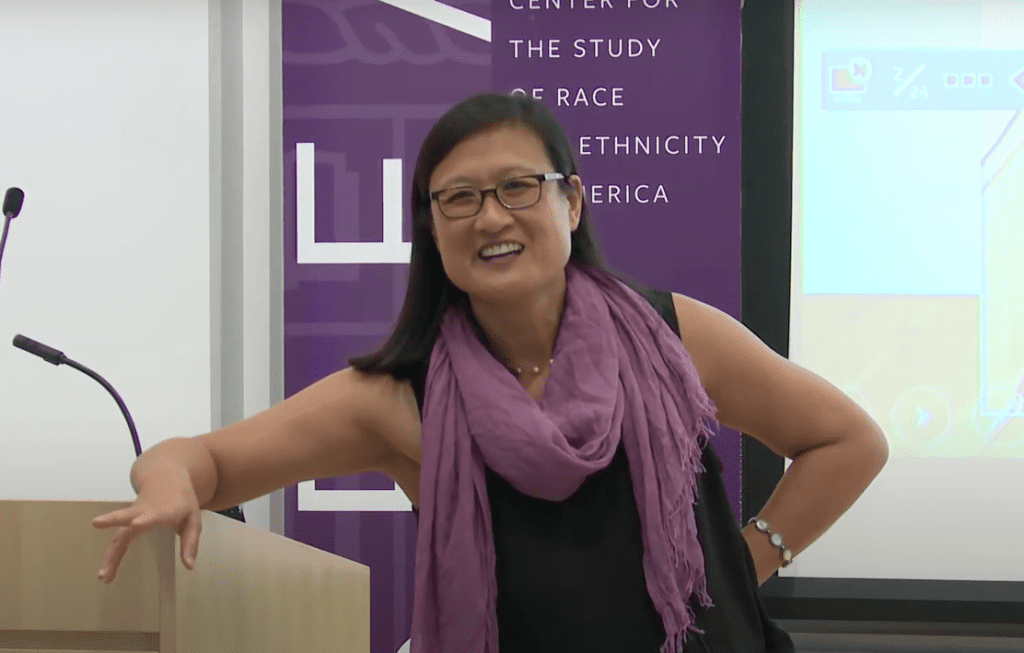Ideology Destroys Sanity, Scholarship

Writing at Yahoo! News, Prof. Jennifer Ho, president of the Association of Asian American Studies and a faculty member at the University of Colorado Boulder, would like you to know that when black people attack Asians, it’s really white people’s fault:
The point I’ve made through all of those experiences is that anti-Asian racism has the same source as anti-Black racism: white supremacy. So when a Black person attacks an Asian person, the encounter is fueled perhaps by racism, but very specifically by white supremacy. White supremacy does not require a white person to perpetuate it.
She, plainly, is a loon driven mad by ideology. Those black teenage girls who carjacked that South Asian man in DC, killing him in the process, are only going to get a slap on the wrist for it — which is just as well, because if you think about it, white people made them do it. Ask Prof. Ho, she’ll tell you.
But this is academia today: an increasingly malignant force. In the UK, a PhD candidate named Christophe de Ray is watching in disgust as the entire academic humanities edifice is being torn down by social-justice barbarians under the name of “de-colonizing the curriculum.” Excerpts:
Universities are presently rolling out sweeping reforms ostensibly designed to promote ‘diversity & inclusion’, and recurringly present these initiatives as acts of ‘decolonisation’. As a finishing philosophy PhD student and teacher at a large UK university, I regularly receive emails announcing conferences, workshops and Zoom meetings about how to go about decolonising academia, the humanities, research, and yes, the curriculum.The frustratingly vague and verbose explanations often given for these projects by their advocates can make it tricky to pin down what these slogans mean, exactly. However, the following resource – a Decolonisation ‘Learning and Teaching Toolkit’ provided by SOAS (London) – is widely shared and relatively concise. You may recall that SOAS made the headlines a few years ago, when its student union called for Plato and Kant to be removed from the philosophy curriculum. Let us therefore come to this epicentre of decolonisation, and see what we can learn from it.According to the Toolkit, the ultimate aims of decolonising the curriculum consist in “transformation through higher education”. The object of ‘transformation’ is, unsurprisingly, “society”, which is plagued by “structural oppression” and “racialised disadvantage”. The text raises ethnic differences in attainment and admissions, as well as reported feelings of “exclusion”, as evidence of the latter. Higher education, we are told, is “necessarily political”, and thus can either be oppressive or liberatory.More:How are these aims to be achieved? By removing the following obstacles to ‘liberation’:1. “the content of syllabi employing concepts, ideas and perspectives that centre or normalise constructions of ‘Westernness’ or ‘whiteness’’ as basic reference points for human society”2. “a very significant presence for scholars racialised as white, gendered as male and located, often by virtue of class privileges, within a limited range of Western institutions or canons”Translated from progressivese, this essentially amounts to the claim that humanities curricula are unduly Eurocentric, since they largely focus on historically Western or European authors, texts and ideas. To ‘decolonise’ them, then, is to change their contents accordingly, thereby ‘diversifying’ the perspectives taught to students.
Read it all. De Ray goes on to explain how this entire enterprise is a fraudulent act of, yes, colonialism.
This is what totalitarians do: they destroy the cultural memories of a people in order to make them easier to control. It is gobsmacking that the gatekeepers and guardians of educational institutions are capitulating in the destruction of the institutions they have been charged with defending.
Why would anyone want to go into academics today? Serious question. I keep saying it over and over, and maybe somebody will believe me and act: all those who want to save the humanities in this Dark Age had better stop trying to shore up this rotten imperium, and instead start building the equivalent of early medieval monasteries: communities within which knowledge and traditional academic practices can survive this barbarian epoch. I’m not exaggerating. It’s that serious.
To that end, here is terrific news: the University of St. Thomas, in Houston, is launching an online MFA Creative Writing program that is solidly Catholic. Students can work either in poetry or in fiction. The founding director is James Matthew Wilson, a very fine scholar and poet, and — I can say this because he’s a personal friend — a serious orthodox Catholic. The press release says:
While there are more than two hundred MFA programs in the United States, the Master of Fine Arts in Creative Writing at the University of St. Thomas is the only one committed expressly to a renewal of the craft of literature within the cosmic scope, long memory, and expansive vision of the Catholic literary and intellectual tradition. With Virgil, Dante, and Flannery O’Connor for guides, we aim to enter into that tradition and to shape its future. Additionally, the MFA in Creative writing at UST is the most affordable program of its kind in the country.
Students will complete three semesters of workshops in their chosen genre (poetry or fiction) and a thesis, while taking exciting, well-integrated seminars in subjects directly related to their work as writers.
The MFA in Creative Writing seeks to transform the life and spirit of contemporary literature. This program is committed to the renewal of serious craft in contemporary literature and the continued revival of the Catholic literary and intellectual tradition.
All is not lost!